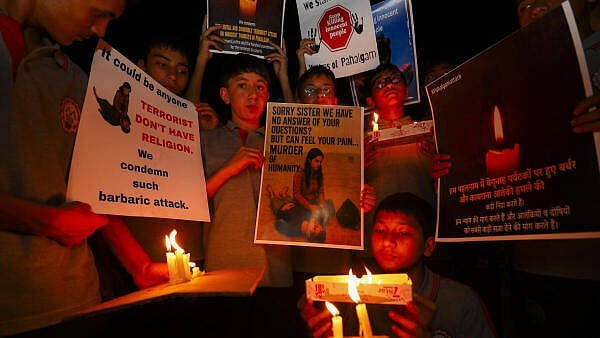
Shia Muslims hold a candlelight vigil in solidarity with victims of the Pahalgam terror attack, in Jammu.
Credit: PTI File Photo
Srinagar: After 26 civilians, mostly tourists, were gunned down in a brutal terror attack in Pahalgam on Tuesday, Kashmir is gripped not by fears of lost tourism—but by the weight of grief.
The deadly attack took place in Baisaran Valley, a popular tourist destination near Pahalgam in south Kashmir’s Anantnag district, where people from various parts of the country had gathered for vacation.
The incident has left a scar deeper than fear—one of guilt. People in Kashmir have come together to hold candlelight vigils and prayers and they are mourning. Heartbreak is nothing new in the bleeding valley—but this time, it isn’t about shutdowns, internet bans, or lost trade. It’s about a broken promise of hospitality.
Kashmir Chamber of Commerce and Industries (KCCI) president Javed Tenga said they were mourning the loss of human life rather than business setbacks. “We are not here to talk about business losses. We are here to mourn human loss,” he said.
“Such acts of violence have no place in Kashmiri society, culture, or values,” he said while terming the attack as ‘inhuman and tragic’.
Ibrahim Raina, owner of Hotel Brown Palace in Pahalgam echoed the same sentiments. “We have seen the worst times – when tourism completely stopped during the peak of the turmoil. (But) never, not even during those years, were tourists harassed. Now, seeing them return home in coffins hurts us more than the blow to our business.”
Iqra Wani, a college student, who was in Pahalgam on a picnic on that black day, said she still hears the gunshots. “I can’t get the screams out of my head. What did they do wrong? They came to see the beauty of Kashmir, not to return in coffins.”
“My heart ached and I cried when I saw their (tourists) bodies in pools of blood being ferried. This is a wound to our soul,” she said.
Abdul Rasheed, a cab driver, who was in Pahalgam that day, said, “We are sorry our guests were targeted. Our livelihood depends on tourism, yes, but more than that—our 'izzat' (honour) depends on how we treat our 'mehmaan' (guests). You can rebuild tourism, but you can’t bring back the dead?”
Kashmir's Grand Mufti, Mufti Nasir-ul-Islam said hospitality flows in the veins of Kashmiri people. “We compete in welcoming tourists—how could we remain silent while our guests were being killed? This is an attack on Kashmiriyat and humanity itself,” he said while criticising a section of national media for spreading hatred.